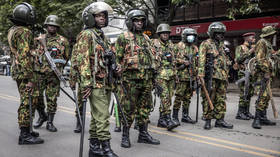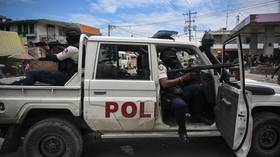Kenyan police begin controversial deployment to Haiti

The first contingent of Kenyan police officers has arrived in Haiti to lead a UN-backed Multinational Security Support (MSS) mission aimed at combating rampant crime gangs and militants. The group of 400 officers departed on Tuesday following a pre-deployment ceremony at the Administration Police Training College in the Kenyan capital, Nairobi, the day before.
“This mission is one of the most urgent, important, and historic in the history of global solidarity,” Kenyan President William Ruto said in an address to the officers on Monday, proclaiming that the country has “solid credentials in peace-making and conflict resolution globally.”
The mission is going ahead despite a court ruling deeming it unconstitutional. Nairobi agreed last October to contribute 1,000 police officers to lead the Haiti mission after the UN Security Council greenlit a US-introduced resolution that called for an international security force to address spiraling violence in the island nation.
In April, the UN called for the “urgent” deployment of the MSS force, describing the first quarter of this year as the “deadliest” for Haitians. Around 2,500 people have been killed in gang violence, with attacks targeting police stations, prisons, schools, hospitals, and religious sites in Port-au-Prince, according to Maria Isabel Salvador, Special Representative of the Secretary-General and Head of the United Nations Integrated Office in Haiti.
Several other countries including Canada, Jamaica, and Senegal have expressed their support for the initiative. Last month, US President Joe Biden pledged $300 million in funding to the multinational force but declared that Washington would not contribute troops because an American military presence in Haiti could generate “all kinds of questions that can easily be misrepresented.”
Some in the impoverished country of 11.4 million people, which the US occupied from 1915–1934 after the assassination of Haitian President Jean Vilbrun Guillaume Sam, object to any Western involvement on the ground due to the past history of military interventions.
Rights organizations, including Haiti-based lobby group Movement Unforgettable Dessalines Jean Jacques, have questioned Kenyan police involvement, citing longstanding abuse allegations against officers.
Meanwhile, Kenya itself descended into chaos on Tuesday when police cracked down on thousands of protesters who stormed parliament to demonstrate against a finance bill introducing controversial taxes. At least five people died from police gunfire and more than 30 others were wounded, Amnesty International and three Kenyan organizations said in a joint statement.













